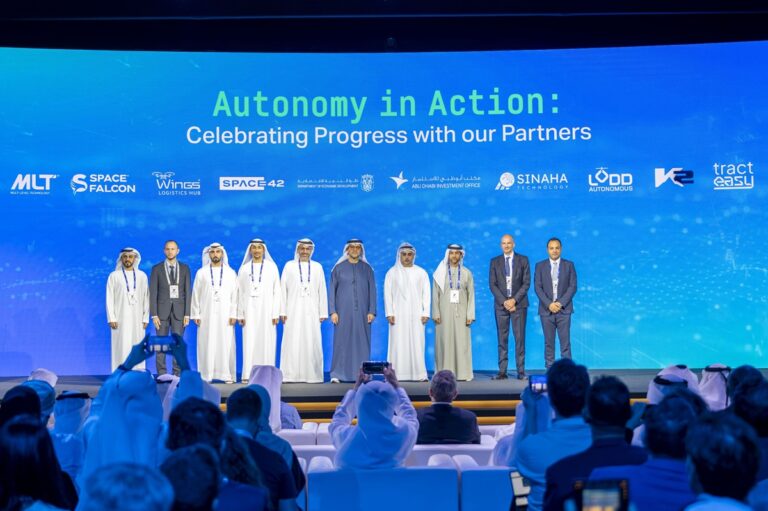Abu Dhabi has announced a major step in its transformation into a global hub for advanced, sustainable and autonomous mobility, unveiling the UAE’s first vertiport network and 29 new commercial deployment agreements for autonomous mobility technologies.
The initiatives, led by the Abu Dhabi Investment Office (ADIO) in collaboration with the General Civil Aviation Authority (GCAA), the Integrated Transport Centre (Abu Dhabi Mobility), and Abu Dhabi Airports (ADA), are part of the Smart and Autonomous Vehicle Industries (SAVI) cluster — a key pillar of the emirate’s innovation-led diversification strategy.
Together, they mark a decisive moment in the creation of a multi-modal transport ecosystem that integrates air taxis, autonomous vehicles, and AI-driven logistics, positioning Abu Dhabi at the forefront of global next-generation mobility.
Abu Dhabi vertiport network
The vertiport network, comprising more than 10 state-of-the-art sites, will enable the operation of electric vertical take-off and landing (eVTOL) aircraft across strategic locations in Abu Dhabi, facilitating low-emission travel and seamless connectivity between key urban, business, and tourism hubs.
Zayed International Airport and Al Bateen Executive Airport have been confirmed as anchor locations, with future phases to connect Yas Island, Saadiyat Island, and Abu Dhabi Island.
Abu Dhabi Airports will act as the anchor investor and primary delivery partner, while Abu Dhabi Mobility and the GCAA are overseeing regulatory and operational frameworks to ensure safety, performance, and integration across the wider transport network.
Each vertiport will be integrated with ground transport and digital infrastructure, supporting smart mobility systems and multimodal connections across the emirate.
Saif Mohammed Al Suwaidi, Director-General of the GCAA, said the initiative reflects a new era for the UAE’s aviation infrastructure, aligning with the nation’s strategy to build an advanced, sustainable air mobility ecosystem and positioning the UAE among the first countries globally to operate eVTOL systems at scale.
Badr Al-Olama, Director-General of ADIO, said integrating eVTOL infrastructure within Abu Dhabi’s transport system under the SAVI cluster “accelerates the deployment of smart and advanced mobility solutions while solidifying the emirate’s position as a leader in future-defining industries.”
29 new autonomous mobility projects announced
On the sidelines of the Abu Dhabi Autonomous Summit, ADIO announced 29 new commercial deployment agreements with global and local partners, enabling autonomous technologies to transition from pilot to full-scale commercial operation.
Partners include:
- K2
- LODD Autonomous
- Autologix
- Sinaha
- TractEasy
- MLG
- Space42
- Talabat
- Noon
- Aramex
- PureLab
- ENEC
The agreements span e-commerce, food delivery, healthcare logistics, and industrial automation, establishing Abu Dhabi as one of the first cities in the world to operate within a fully integrated regulatory and infrastructure environment for autonomous systems.
Badr Al-Olama said: “Abu Dhabi is leading the transformation in smart mobility and logistics, with these 29 commercial pilot agreements marking a decisive step toward a future where autonomous technologies set new standards for transportation and trade.
“Anchored by the Smart and Autonomous Vehicle Industries (SAVI) cluster, these agreements translate decades of R&D into tangible commercial deployment.”
From drones to driverless cargo
The agreements include autonomous drone delivery pilots led by LODD, working with PureLab, Noon, and Aramex, to transport medical samples, parcels, and mail between sorting hubs and drop-off stations.
Sinaha Technology is developing AI-driven ground logistics through autonomous vehicles, robotics, and intelligent warehouse systems, while Autologix has partnered with Emirates Post to launch Level 4 autonomous cargo vehicles built without driver cabins or steering wheels.
In addition, K2, in collaboration with Talabat and ENEC, is testing AI-enabled electric delivery fleets and autonomous drones for last- and middle-mile logistics, supported by Abu Dhabi Mobility and the Department of Municipalities and Transport.
These pilots are advancing sustainable, electric, and data-driven logistics, enhancing efficiency and supporting the emirate’s net-zero targets.
Autonomous economy
The combined initiatives — spanning air mobility, ground transport, and logistics — reflect the emirate’s integrated approach to smart mobility, where regulation, infrastructure, and innovation advance together under the guidance of the Smart and Autonomous Systems Council (SASC).
This framework enables the real-world testing and commercial deployment of autonomous technologies while ensuring safety, sustainability, and scalability.
Dr Abdulla Hamad AlGhfeli, Acting Director-General of the Integrated Transport Centre, said the vertiport network represents “a significant milestone in shaping the future of urban mobility,” reinforcing Abu Dhabi’s vision for next-generation transport.
Elena Sorlini, Managing Director and Chief Executive Officer of Abu Dhabi Airports, said: “As the anchor delivery partner for Abu Dhabi’s vertiport network, Abu Dhabi Airports will be critical in shaping the infrastructure, operations and commercial readiness of advanced air mobility in the emirate.”
Together, these initiatives demonstrate the emirate’s ambition to become the world’s most advanced hub for autonomous mobility, driving economic diversification, global investment, and a sustainable transport future.

